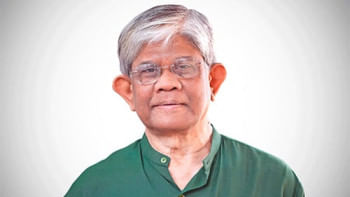Nat'l mental health instt a gigantic mess
Undergoing treatment at a psychiatric hospital, Riad astonished his family when the 14-year-old said he would take medicine only if he was allowed to smoke marijuana or drink alcohol afterwards. He was finally given sedatives and put to sleep.
But the family was wondering how come he knew about alcohol or weed -- the boy was being treated for mood disorder, not for drug abuse.
"He studied in a madrasa," said his mother Jahan. "He was raised under strict supervision. I am more than sure he did never have a chance to get introduced to these stuff."
Riad is admitted to the male ward-1 of the National Institute of Mental Health and Research (NIMHR).
An attendant of another patient, Saiful, who witnessed Riad make that announcement before falling asleep, said the boy might have learnt the words after his admission into the ward named "Unit for Drug Addicts".
Several other children and youths are also getting treatment at the ward for various mental conditions, and Riad is just one of them.
Tanvir Ahmad Pranto, 18, has stopped taking bath in fear, apparently in reaction to the chaotic environment in the ward where substance abusers are also being treated.
Seeking anonymity, a nurse of the ward said, "Drug abusers must be treated in secluded areas where nobody except for people treating them is allowed to enter."
In room no. 404, Shakil gets scared often.
"I think he used to smoke pot, and he gets afraid so easily," said the 20-year-old's father Nazrul.
Next to his room, three criminals were being treated under police custody.
Apart from three prison guards, six policemen were guarding the room.
One of the guards said, "Generally criminals who killed their parents or siblings for land or property eventually lose their mental balance and are brought here for treatment."
Dr Khasru Parvez, head of the forensic psychiatry department at NIMHR, said children should get special care as the way they thought was completely different from adults'.
"Though, globally, it is encouraged to treat all patients in a general inclusive system, kids should obviously be taken care of especially," he said.
NIMHR Director Prof Abdul Hamid acknowledged that criminals, drug abusers, and children should not be treated at the same place, especially when it was about mental conditions.
"The manpower shortage has thrown us into this mess," he said.
There are 165 employees against 217 positions at NIMHR, shows its website. Of the 52 vacant posts, at least 42 are supposed to be filled with class III and IV employees.
The director explained that the NIMHR building was not designed in a way wherein patients with different needs could be treated in separate wards.
POOR SERVICES
Though it was mentioned at different places of the hospital that emergency services were open 24/7, this correspondent found the section deserted from 7:30pm to 9:30pm on September 8.
The next day, the emergency section was found locked. The director said, "Since the outpatient department is open, we kept the emergency section closed for the manpower shortage."
Regarding allegations that doctors visit patients no more than twice a week for being involved in private practice, Hamid said it was not true. "One must take leave for private practice," he said.
Prof Shamiul Islam, director general of the Directorate General of Health Services (DGHS), said specialised hospitals took time to increase their manpower. "We are trying to build the workforce," he said.
'TOO QUICK'
In a recent visit to Shishu Bikash Kendra, the correspondent saw at least five children were called into a small room where five doctors listened to their problems at a time.
Mariya Akhter Jui, 14, who came from Tangail, was asked to come 20 days later but his father Abdul Jalil did not know what she was suffering from.
Doctors did not take the time to describe it to him.
A cousin of Sumaiya, 14, who took a 7-hour overnight bus ride from Meherpur to come to the hospital, expressed his disappointment.
"This should not be the way of seeing a mental patient," Rabiul Islam, 35, said, referring to the five doctors seeing five patients at a time and so quickly.
"At least half an hour should be spent for each patient," he thinks. "They are doing it just because they have to do it, denying patients a chance to open up."

 For all latest news, follow The Daily Star's Google News channel.
For all latest news, follow The Daily Star's Google News channel. 



Comments